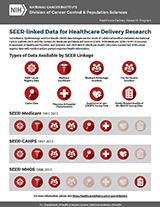HDRP Newsletter, January 2018
Message from the HDRP Associate Director

New Year’s Greetings to Everyone.
While most of the birds have flown south and many creatures around here are hibernating, we at HDRP have been quite busy with several activities.
On November 29, 2017 HDRP Program members contributed to three important presentations at the semi-annual joint meeting of NCI’s Board of Scientific Advisors and National Cancer Advisory Board. These boards, both of which are comprised of outside experts, provide advice on a wide variety of matters concerning scientific program policy, progress and future direction of NCI's extramural research programs, and concept review of extramural program initiatives. The three presentations were: a proposal for the reissuance of the request for applications for the NCI Community Oncology Research Program (NCORP); an update on activities related to development and use of the Patient-Reported Outcome version of the Common Terminology Criteria for Adverse Events (PRO-CTCAE), and a preview of the upcoming President’s Cancer Panel report on enabling patients’ access to high value drugs. More information about the Cancer Care Delivery Research component of NCORP is included in this newsletter and on our CCDR page. More information about PRO-CTCAE can be found here.
In the last newsletter, I wrote about four Cancer Moonshot funding opportunities program members were involved in developing that had just been approved by the NCI’s Board of Scientific Advisors. These opportunities focus on: improving symptom management across the cancer continuum; accelerating colorectal cancer screening and follow-up through implementation science; developing new approaches to identifying and caring for individuals with inherited cancer syndromes; and evaluating ways to analyze patient-reported symptom toxicity data. All four were subsequently published in the NIH Guide to Grants and Contracts. To aid potential applicants, a webinar was then organized for each funding opportunity, during which NCI staff reviewed the goal of the announcement, described the required elements of an application, and answered questions. We were very pleased with the numbers of individuals who signed up for these webinars and hope they were helpful to the research community. For those not able to join live, the webinars were archived for later viewing. Receipt dates for applications in response to these funding announcements are all in January, and we anticipate that funds will be awarded to successful applicants before the end of the 2018 fiscal year.
If you don’t already, I encourage you to subscribe to our listserv to stay up-to-date on all of our ongoing activities.
to stay up-to-date on all of our ongoing activities.
Sincerely,
Paul Jacobsen, PhD
Spotlight on… Cancer Care Delivery Research within the NCI Community Oncology Research Program
The NCI Community Oncology Research Program (NCORP) is a national network that brings cancer prevention and treatment trials, as well as Cancer Care Delivery Research (CCDR) to people in their communities. Within NCORP, CCDR is a multidisciplinary science that seeks to improve clinical outcomes and patient well-being by intervening on patient, clinician, and organizational factors that influence care delivery. NCORP is a unique environment for conducting CCDR studies because it offers over 900 diverse components (e.g. hospitals, cancer centers, oncology clinics) across 39 states, which allows for the integration of evidence-based practices into clinical workflow. Clinicians collaborate in the process of designing and conducting CCDR studies by providing perspective on feasibility and acceptability.
Significant progress has been made in CCDR since this area was launched within the NCORP network four years ago. Currently, five CCDR studies are open, which have accrued over 1,300 patients and clinicians in total. CCDR study topics include use of guidelines, financial toxicity, and decision aids. Details about the studies are below:
| Research Base | Study Title | Principal Investigator |
|---|---|---|
| SWOG | Implementation of a Prospective Financial Impact Assessment Tool in Patients with Metastatic Colorectal Cancer | Veena Shankaran, MD, MS |
| SWOG | A Pragmatic Trial to Evaluate a Guideline-Based Colony Stimulating Factor Standing Order Intervention (TRACER) | Scott Ramsey, MD, PhD |
| COG | Improving the use of Evidence-Based Supportive Care Clinical Practice Guidelines in Pediatric Oncology | Lee Dupuis, RPh, PhD |
| Alliance | Testing Decision Aids to Improve Prostate Cancer Decisions for Minority Men | Jon Tilburt, MD |
| COG | Documentation and Delivery of Guideline-Consistent Treatment in Adolescent and Young Adult (AYA) Acute Lymphoblastic Leukemia | Julie Wolfson, MD, MSHS |
The NCORP network has focused more recently on expanding the participation of community oncologists, primary care physicians, and chief operating officers by engaging these stakeholders in CCDR Landscape Assessments, which have been administered at 225 practice units. The goal of these assessments is to learn about the capacity of sites and their ability to carry out CCDR studies as well as gather input for future study development. NCORP Principal Investigators, Administrators, CCDR Leads, and staff have also engaged with each other through periodic webinars and at the NCORP Annual Meeting, where topics such as financial toxicity, the science of CCDR, and upcoming CCDR studies have been discussed.
NCORP is funded through a cooperative agreement grant and the process to renew the Request for Applications (RFA) was presented to the Board of Scientific Advisors (BSA) and the National Cancer Advisory Board (NCAB) on November 29th, 2017. You can watch the archived BSA/NCAB meeting here . Members of the BSA voted enthusiastically to approve the reissuance of the program. More information about the RFA will be available in the coming months.
. Members of the BSA voted enthusiastically to approve the reissuance of the program. More information about the RFA will be available in the coming months.
Updates
Communications Evaluation
We are currently fielding a communications evaluation to help us gain a better understanding about which of our existing communications efforts are most widely received and impactful. Going into our fourth year as a program, we continue to seek ways to increase our visibility, use of our resources, and numbers of applications submitted to our funding opportunities. Your input is valuable and will enable us to evaluate and tailor our communications strategies to best suit the needs of our research community.
Notice of Funding Opportunity (NOFO) Webinars
During the second half of 2017, HDRP led several webinars that provided an overview and an opportunity to ask questions about recently issued NOFOs. These webinars are archived here. Additional webinars will be held in 2018 and will be listed on our Events and Media page.
-
NCI/AcademyHealth Healthcare Delivery Research Visiting Scholars Program

In 2017, HDRP partnered with AcademyHealth
 to launch the NCI/AcademyHealth Healthcare Delivery Research Visiting Scholars Program. This program provides a year-long, funded, part-time opportunity to mid-career researchers to develop and pursue new research aims that advance both their own career goals and the field of healthcare delivery research more broadly. Through a rigorous and competitive application process, Dr. Larissa Nekhlyudov
to launch the NCI/AcademyHealth Healthcare Delivery Research Visiting Scholars Program. This program provides a year-long, funded, part-time opportunity to mid-career researchers to develop and pursue new research aims that advance both their own career goals and the field of healthcare delivery research more broadly. Through a rigorous and competitive application process, Dr. Larissa Nekhlyudov was selected to participate as the 2017-2018 scholar. While at NCI, Dr. Nekhlyudov will work on a project to identify quality measures for cancer survivorship care that are clinically relevant and may be readily implemented and measured in diverse clinical settings for the purposes of research.
was selected to participate as the 2017-2018 scholar. While at NCI, Dr. Nekhlyudov will work on a project to identify quality measures for cancer survivorship care that are clinically relevant and may be readily implemented and measured in diverse clinical settings for the purposes of research. SEER Linkages for Healthcare Delivery Research

HDRP staff manage three unique data resources that link SEER cancer registry data with medical and/or patient-reported health information. SEER-Medicare, which links patients included in the SEER cancer registry data with their Medicare enrollment and claims data, is a population-based resource with longitudinal data on over 2 million cancer patients and nearly one million non-cancer controls that allows for research across the cancer continuum. New nursing home and home health care data will be included in the 2018 linkage. SEER-CAHPS, which links patient experience surveys (CAHPS) with SEER cancer registry data and Medicare claims, just completed its 2017 linkage. The publicly accessible data offers a rich opportunity for analyses of cancer patient experiences and now includes over 240,000 patients with cancer. SEER-MHOS is a publicly accessible linked data resource which combines SEER cancer registry data with the two-wave Medicare Health Outcomes Survey (MHOS) on the health of Medicare Advantage Beneficiaries. Over 147,000 individuals with a history of cancer in SEER are included. To learn more on the data resource and how to apply for a data use agreement. A brief infographic showing the types of data that these resources include can be found here.
PRO-CTCAE Language Translations
The Patient-Reported Outcomes version of the Common Terminology Criteria for Adverse Events (PRO-CTCAE™) is a patient-reported outcome measure developed to evaluate symptomatic toxicity in patients on cancer clinical trials. It was designed to be used as a companion to the Common Terminology Criteria for Adverse Events (CTCAE), the standard lexicon for adverse event reporting in cancer trials. PRO-CTCAE has recently been translated and linguistically validated in a wide range of additional languages including Polish, Russian, Greek and French. By the end of January 2018, the PRO-CTCAE instrument and online Form Builder tool will be publicly available in over a dozen different languages, including English, Czech, Danish, French (Canada), French (Belgium, France, Switzerland), German, Greek, Hungarian, Italian, Japanese, Korean, Polish, Spanish, and Russian. Several additional language versions of PRO-CTCAE, including Simplified Chinese, Romanian, and Turkish are in development. The availability of PRO-CTCAE in a wide range of languages is crucial for the multinational conduct of cancer clinical trials.
Small Business Innovation Research (SBIR) Projects on Healthcare Delivery Research Topics
In late 2017, four contracts were awarded under two separate SBIR topics put forward by HDRP. Under the topics of Informatics Tools to Measure Cancer Care Coordination, a contract was awarded to GreenWave LLC to build a set of informatics tools to measure cancer care coordination, with the ultimate goal of building an integrated, interoperable set of informatics tools that improve cancer care coordination. Under the topic of Digital Platforms to Support Informal Cancer Caregiving, three contracts were awarded: (1) BrightOutcome Inc. will develop an electronic caregiver support system aimed at addressing caregiving needs and caregiver personal needs; (2) Care Progress LLC will create a smart phone application that will allow caregivers to access patient electronic health record information and communicate with clinicians; and (3) Medable Inc will develop and implement a digital application to assist informal caregivers with developing an interactive care plan for home-based care for cancer survivors. More information about the SBIR program can be found here
 .
.Patterns of Care/Quality of Care (POC/QOC) Update
The POC/QOC initiative, which began in 1987, provides an opportunity to evaluate the dissemination of state-of-the-art therapies into community practice. Building upon SEER’s primarily hospital-based data collection, POC/QOC studies collect data on care provided in the outpatient setting. Additional data, such as biomarker and genetic testing, are also collected and verified through physician contact. In the current one-year study, which began in August 2017, data for patients diagnosed with pancreas, head and neck, and uterine cancer in 2016 are being abstracted to examine the impact, uptake, trends, and disparities of treatment and testing for these cancers. In the meantime, NCI is also beginning a process to assess and update our data collection methods for future POC/QOC studies. Our longer-term planning efforts will address changes in the health care arena, such as the growing volume of electronic data available and need for timely assessment of rapidly changing treatment paradigms.
2017 Division of Cancer Control and Population Sciences (DCCPS) Overview and Highlights
The 2017 issue of the DCCPS Overview and Highlights is available online here
 . This issue focuses on areas of research in which the division hopes to have the greatest and most immediate impact through our funded science.
. This issue focuses on areas of research in which the division hopes to have the greatest and most immediate impact through our funded science.
Funding
NIH Clinical Trials Research Requirements
NIH requirements for clinical trials research have been recently updated to enhance the accountability and transparency of the biomedical research enterprise as well as increase the sharing of clinical trials results. If you are conducting NIH-funded research that involves human subjects, you will need to determine if your research study meets the NIH definition of a clinical trial and then determine if there is an appropriate NOFO available for your clinical trials research. Additional policies have been put in place to streamline application forms, seek IRB approval for multisite research, and report clinical trials results. Information about these policy changes can be found on the NIH website
 .
.New Web Pages
The HDRP website now contains information about current funding opportunities as well as resources for developing grant applications. Notably, we have new pages that provide guidance to investigators interested in seeking funding for a Program Project Grant (P series) or who plan to submit an Awaiting Receipt of Application (ARA) request. Please see here for more information.
Recently Released Funding Opportunities
- Using Information Technology to Support Systematic Screening and Treatment of Depression in Cancer [PA-18-492 (R21 Clinical Trial Optional) and PA-18-493 (R01 Clinical Trial Optional)]
- Multilevel Interventions in Cancer Care Delivery: Follow-up to Abnormal Screening Tests [PA-17-495 (R01 Clinical Trial Optional)]
- NIH Research Project Grant (Parent R01 Clinical Trial Not Allowed) [PA-18-484]
- Cancer Prevention and Control Clinical Trials Grant Program (R01 Clinical Trial Required) PAR-18-559]
*note that the first submission date is March 15, 2018 and then standard R01 submission dates
 apply.
apply.
Other relevant funding opportunities can be found here.
Upcoming Opportunities to Connect with HDRP Staff
Spring travel season is just around the corner. We encourage you to seek out and say hello to our staff at one of these upcoming large events: ASCO Survivorship Symposium from February 16-17; American Psychosocial Oncology Society from February 22-24; Society of Behavioral Medicine Annual Meeting, April 11-14; Health Care Systems Research Network Conference from April 11-13; and American Society of Clinical Oncology Annual Meeting from June 1-5. Our staff will also be attending other conferences throughout the spring and we will share updates via our Twitter/X account (@NCICareDelivRes).
Meet the Funders Session at the ASCO Survivorship Symposium
HDRP staff, including Drs. Paul Jacobsen, Sandra Mitchell, Janet de Moor, and Michelle Mollica will be providing an overview of new and ongoing funding opportunities and initiatives in this interactive Q&A session. Time and date to be announced via @NCICareDelivRes.
New Staff

Angela Falisi
Angela is a Presidential Management Fellow in the Office of the Associate Director. Angela supports operations activities and processes across the program including travel, budget, and communications.

Roxanne Jensen
Roxanne is a Clinical Research Scientist in the Outcomes Research Branch. Her research focuses on the evaluation and implementation of patient-reported outcomes in cancer clinical research and practice settings, with an interest in better understating symptom management issues in cancer survivorship.

Elisabeth Kato
Elisabeth is a Medical Officer in the Office of the Associate Director. She works with the NCORP team to advance the science of Cancer Care Delivery Research, with a focus on safety and adverse event monitoring on care delivery clinical trials.

Lianne Priede
Lianne is a Cancer Research Training Award Fellow in the Office of the Associate Director. She is a member of the HDRP team working on Cancer Care Delivery Research within the NCI Communication Oncology Research Program.

Elizabeth Sarma
Elizabeth is a Cancer Prevention Fellow in the Health Systems and Interventions Research Branch. Her research focuses on patterns and predictors of adherence to guidelines for cancer screening and cancer prevention behaviors.

Elizabeth Siembida
Liz is is a Cancer Prevention Fellow in the Outcomes Research Branch. Central to her research interests is a recognition of the implications of a cancer diagnosis in different stages of development and the life course.

Michelle Silver
Michelle is a Cancer Prevention Fellow in the Health Services and Interventions Branch. Her research interests center around applied/translational epidemiology, and how to best use the results of epidemiologic studies to make evidence-based decisions in cancer screening and prevention, both domestically and internationally.
